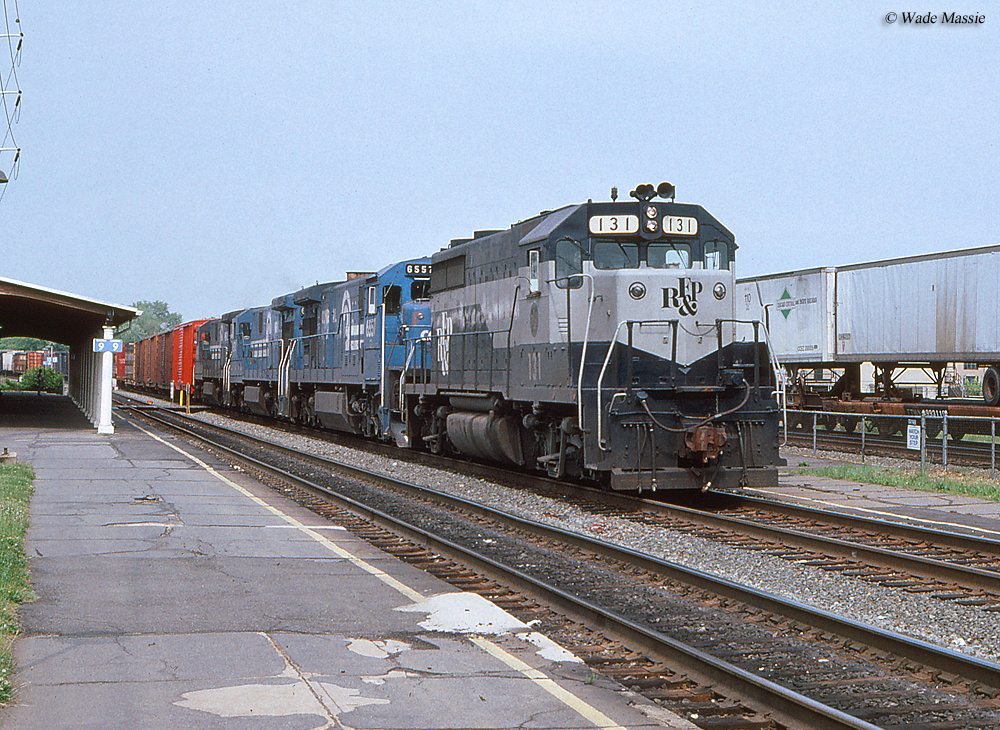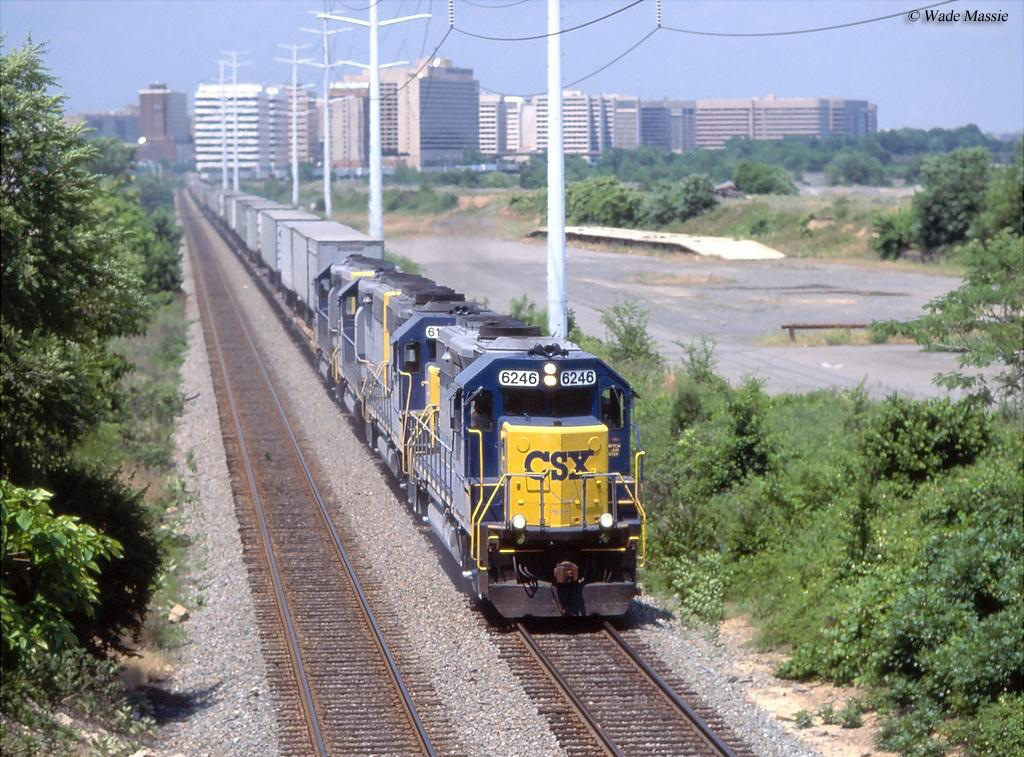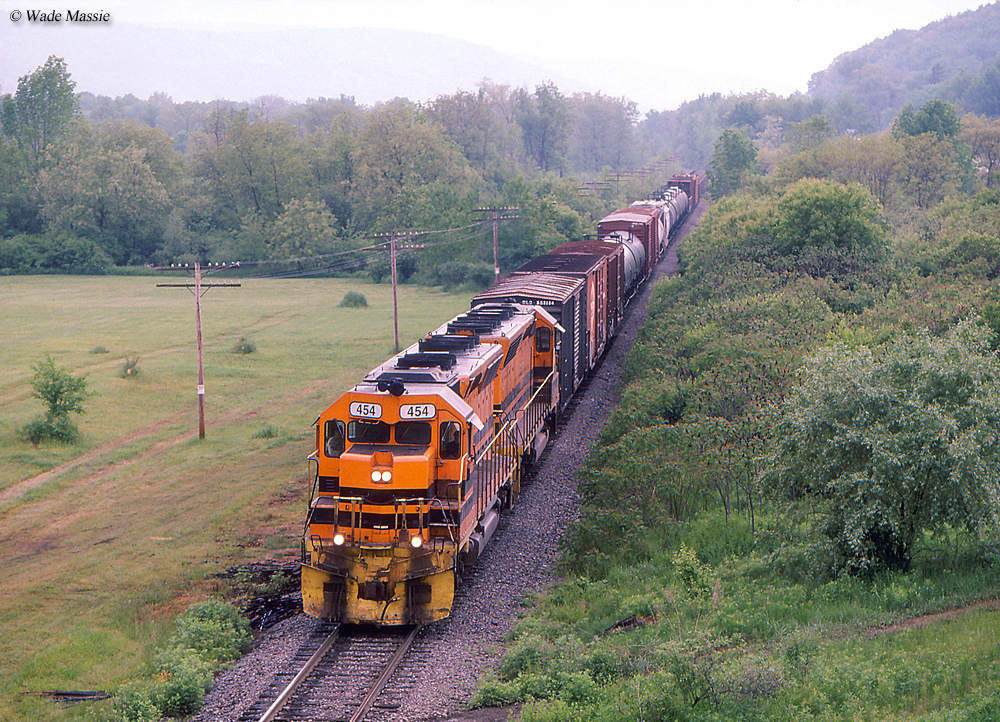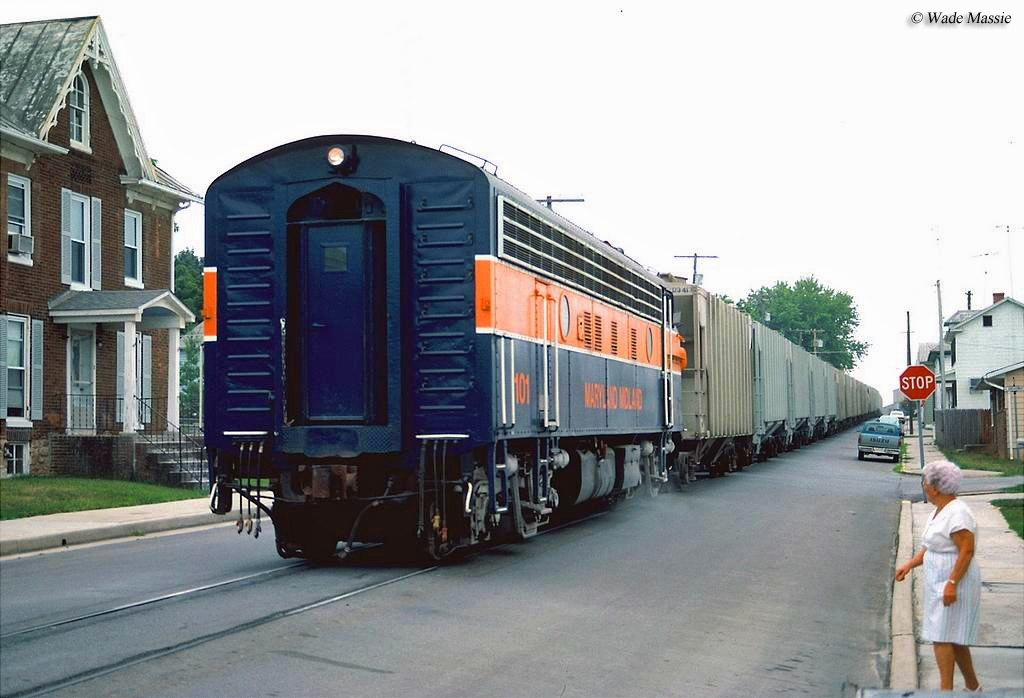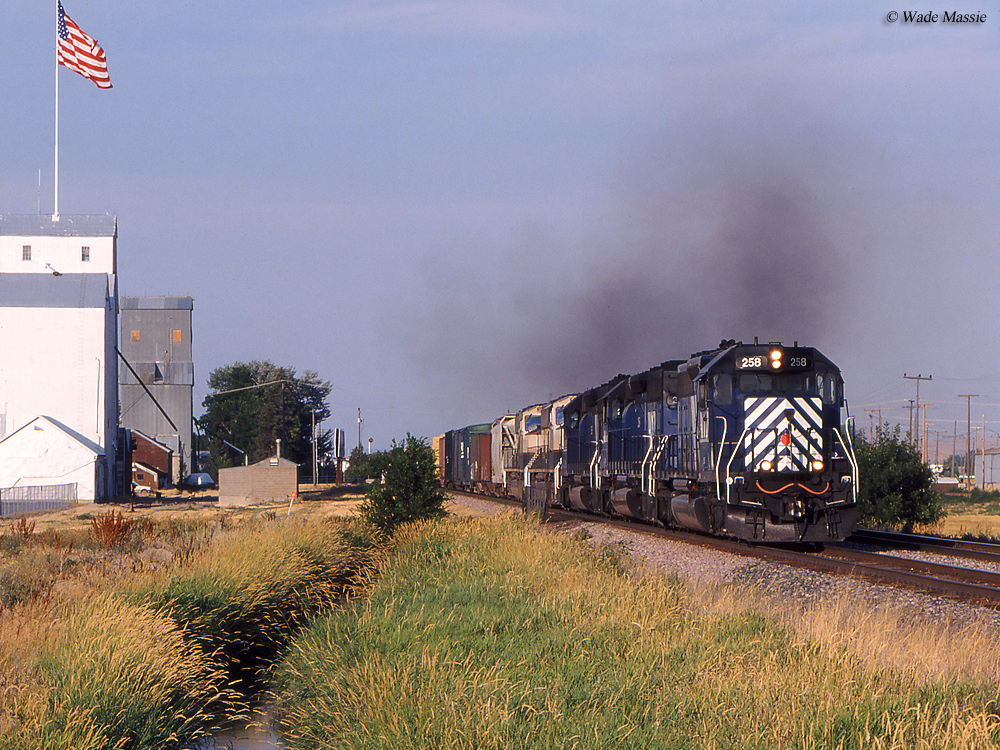- Home ›
- Jobs ›
- Trainmaster
Trainmaster (Railroad): Overseeing Safe Terminal Operations
Last revised: September 6, 2024
By: Adam Burns
If you're interested in the position of trainmaster it can best be described as hectic and stressful at best. While the technologies have greatly improved over the years this position has remained relatively unchanged.
As trainmaster your duties generally include safely seeing the arrival and departure of trains in and out of your terminal.
To achieve this you have to be in constant contact with personnel such as the train crew, yardmasters, dispatchers, and others.
Because of your responsibility if anything goes wrong within the terminal (regarding train movements) be prepared to hear about it!
A trainmaster is essentially a mid-manager position; within larger Class I's a trainmaster can expect further managerial promotions over time.
Without question the position is one of the most stressful one can take on requiring a cool head, thinking clearly under immense pressure, and strong leadership qualities.
While most trainmaster positions entail requirements as mentioned above, on smaller operations these can include even more including working [and building relationships] with customers, overseeing company employees (and sometimes taking part in their training), and of course make sure trains are operating safely and on-time.
While the position of trainmaster means that you will most often be indoors either answering calls, on the radio, or directing trains this certainly doesn't mean you will never be outside.
Depending on the location and company under which you are employed you can expect to spend some time outdoors in all types of weather.
During this time you will be doing things such as helping yard personnel or inspecting a train. Keep in mind that this means you will be exposed to all types of weather so be prepared to dress accordingly.
An individual employed with Conrail many years back described his experience column as a trainmaster during the 1980s in a Trains Magazine.
He spoke of the high level of stress the job entails, the long hours one must work, and how you really must have a thick skin to brush off the constant criticism.
Other Railroad Careers
Brakemen
Freight Train Conductor
Railroad Engineers
Signal Maintainer
Roadmaster
Tie Gang Laborer
Train Dispatcher
Yardmaster
Perhaps more than anything else, the toughest part of the job was simply learning everything involved; once you become more comfortable with it the job is usually more manageable.
For this individual, however, the position was not for him and he moved on to a new career after just a few years.
As with any job involving great responsibility compensation is commensurate; starting salaries for trainmaster usually begin in the $80,000's on Class I railroads.
For smaller lines you will need to inquire about pay. Please be aware the job of trainmaster is not an entry-level position requiring not only a engineer's qualification but also experience in railroading, usually at least 3 years on the job.
Railroading in general can be a tough if you cannot handle criticism well, as it's just part of the job. Like the train crew, trainmasters also work odd, and long hours.
When you first hire on as an assistant trainmaster you almost always are given the most unpleasant hours, midnights.
Fatigue can also become a factor which you must learn to deal with. Despite this there are plenty of positives with such work. In general a job in the railroad industry offers excellent pay as well as benefits and retirement.
Trainmasters also normally move up into higher management positions and how high you wish to go in the department or company really depends on you.
For instance, here are some of the requirements one railroad expects to be a trainmaster:
Skills
- Strong oral and written communications skills. Working knowledge of GCOR
- Strong computer skills; knowledge of Microsoft Office (e.g. Word; Excel)
- Knowledge of operating-focused applications (e.g., LMS)
- Knowledge of train schedules, railroad freight equipment and locomotives, the national rail network, railroad operating functions, tracks, bridges, structures, signals, Maintenance of Way
Primary Duties
- Ensures safety of terminal in which located
- Coordinates with foreign line railroads
- Plans interchanges
- Coordinates with transportation center regarding calls of trains.
- Oversees departures of trains.
One again, these duties are exemplified on smaller carriers. For instance, short line Lake State Railway expects the following:
- Supervise and coordinate the activities of train crews. Provide oversight and direction to the crews in accordance with the all federal laws and Company’s policies and procedures.
- Promote the Company safety initiative. Instill a culture of safety.
- Ensure the daily operating plan is properly executed as required by the train crews.
- Prevent personal injuries and accidents by actively and aggressively promoting employee habits, attributes, and behavior with a goal of avoiding accidents/injuries.
- Provide effective performance feedback through employee recognition, rewards, and disciplinary action with the assistance of Human Resources, when necessary, in accordance with the Company policies.
- Ensure compliance with all U.S. Department of Transportation, Federal Railroad Administration, and Company safety and operating rules through personal observation of train crews and other departments.
- Initiate and provide an accurate, complete, and timely investigation of all accidents and incidents, including causes, remedial action, and recommended solutions.
- Monitor locomotive usage for fuel efficiency.
- Conduct efficiency tests, check rides, stop tests, and other types of performance evaluations according to company practices to determine the effectiveness of training and to monitor rules compliance.
- Reduce crossing incidents through involvement in Operation Lifesaver and other community awareness programs.
- Download event recorders and review train handling practices with crews.
- Maintain accurate reports and records as required by the Company, FRA, and other governing agencies.
- Since trains run day and night, this position will require work on days, evenings, nights, weekends and holidays and willingness to travel is a must. This position is required to be a first-responder to any accident or incident.
- Other duties as assigned by the Company.
So, if you enjoy this line of work or have excellent communication and writing skills then you should really look into it.
While formal classes usually aren't required to be a trainmaster the Class I railroads do prefer those with college degrees and at least a year's experience in day-to-day operations.
You can also find trainmaster positions with a number of larger short lines (Class III) and regional (Class II) systems such as the operated by conglomerates Iowa Pacific, Genesee & Wyoming, Watco Companies, and others.
To find out simply research these companies, or other, by doing web searches. You can also find out where they are located near your area by visiting the state-by-state information here.
To put it bluntly the job is exhausting; expect the unexpected.
Again, if you are not even sure if a career in railroading is right for you but would like to learn more about what it takes to work in the industry you might want to consider the book Working on the Railroad from noted author Brian Solomon.
Solomon's book details the history of working in the railroad industry and the difficulties and hardship employees faced back then as well as today. After reading this book you should have a good idea bout whether working in the industry is something you are truly interested in.
Recent Articles
-
Northern Pacific 4-6-0 No. 1364 Returns To Life
Feb 24, 26 11:12 AM
The whistle of Northern Pacific steam returned to the Yakima Valley in a big way this month as Northern Pacific 4-6-0 No. 1364 moved under its own power for the first time in 73 years. -
CSX’s 2025 Santa Train: 83 Years of Holiday Cheer
Feb 24, 26 10:38 AM
On Saturday, November 22, 2025, CSX’s iconic Santa Train completed its 83rd annual run, again turning a working freight railroad into a rolling holiday tradition for communities across central Appalac… -
Alabama Murder Mystery Dinner Train Rides
Feb 24, 26 09:25 AM
There is currently one location in the state offering a murder mystery dinner experience, the Wales West Light Railway! -
Rhode Island Murder Mystery Dinner Train Rides
Feb 24, 26 09:21 AM
Let's dive into the enigmatic world of murder mystery dinner train rides in Rhode Island, where each journey promises excitement, laughter, and a challenge for your inner detective. -
Virginia Wine Tasting Train Rides
Feb 24, 26 09:20 AM
Wine tasting trains in Virginia provide just that—a unique experience that marries the romance of rail travel with the sensory delights of wine exploration. -
Tennessee Wine Tasting Train Rides
Feb 24, 26 09:17 AM
One of the most unique and enjoyable ways to savor the flavors of Tennessee’s vineyards is by train aboard the Tennessee Central Railway Museum. -
Southeast Wisconsin Eyes New Lakeshore Passenger Rail Link
Feb 23, 26 11:26 PM
Leaders in southeastern Wisconsin took a formal first step in December 2025 toward studying a new passenger-rail service that could connect Milwaukee, Racine, Kenosha, and Chicago. -
MBTA Sees Over 29 Million Trips in 2025
Feb 23, 26 11:14 PM
In a milestone year for regional public transit, the Massachusetts Bay Transportation Authority (MBTA) reported that its Commuter Rail network handled more than 29 million individual trips during 2025… -
Historic Blizzard Paralyzes the U.S. Northeast, Halts Rail Traffic
Feb 23, 26 05:10 PM
A powerful winter blizzard sweeping the northeastern United States on Monday, February 23, 2026, has brought transportation networks to a near standstill. -
Mt. Rainier Railroad Moves to Buy Tacoma’s Mountain Division
Feb 23, 26 02:27 PM
A long-idled rail corridor that threads through the foothills of Mount Rainier could soon have a new owner and operator. -
BNSF Activates PTC on Former Montana Rail Link Territory
Feb 23, 26 01:15 PM
BNSF Railway has fully implemented Positive Train Control (PTC) on what it now calls the Montana Rail Link (MRL) Subdivision. -
Cincinnati Scenic Railway To Acquire B&O GP30
Feb 23, 26 12:17 PM
The Cincinnati Scenic Railway, through an agreement with the Raritan Central Railway, to acquire former B&O GP30 #6923, currently lettered as RCRY #5. -
Texas Dinner Train Rides On The TSR
Feb 23, 26 11:54 AM
Today, TSR markets itself as a round-trip, four-hour, 25-mile journey between Palestine and Rusk—an easy day trip (or date-night centerpiece) with just the right amount of history baked in. -
Iowa Dinner Train Rides On The B&SV
Feb 23, 26 11:53 AM
If you’ve ever wished you could pair a leisurely rail journey with a proper sit-down meal—white tablecloths, big windows, and countryside rolling by—the Boone & Scenic Valley Railroad & Museum in Boon… -
North Carolina Wine Tasting Train Rides
Feb 23, 26 11:48 AM
A noteworthy way to explore North Carolina's beauty is by hopping aboard the Great Smoky Mountains Railroad and sipping fine wine! -
Nevada Wine Tasting Train Rides
Feb 23, 26 11:43 AM
While it may not be the first place that comes to mind when you think of wine, you can sip this delight by train in Nevada at the Nevada Northern Railway. -
Reading & Northern Surpasses 1M Tons Of Coal For 3rd Year
Feb 22, 26 11:57 PM
Reading & Northern Railroad (R&N), the largest privately owned railroad in Pennsylvania, has shipped more than one million tons of Anthracite coal for the third straight year. This was an impressive f… -
Minnesota's Northstar Commuter Rail Ends Service
Feb 22, 26 11:43 PM
Metro Transit has confirmed that Northstar service between downtown Minneapolis (Target Field Station) and Big Lake has ceased, with expanded bus service along the corridor beginning Jan. 5, 2026. -
Tri-Rail Sets New Ridership Record in 2025
Feb 22, 26 11:24 PM
South Florida’s commuter rail service Tri-Rail has achieved a new annual ridership milestone, carrying more than 4.5 million passengers in calendar year 2025. -
CSX Completes Major Upgrades at Willard Yard
Feb 22, 26 11:14 PM
In a significant boost to freight rail operations in the Midwest, CSX Transportation announced in January that it has finished a comprehensive series of infrastructure improvements at its Willard Yard… -
New Hampshire Wine Tasting Train Rides
Feb 22, 26 09:39 AM
This article details New Hampshire's most enchanting wine tasting trains, where every sip is paired with breathtaking views and a touch of adventure. -
New Jersey Wine Tasting Train Rides
Feb 22, 26 09:37 AM
If you're seeking a unique outing or a memorable way to celebrate a special occasion, wine tasting train rides in New Jersey offer an experience unlike any other. -
Nevada Murder Mystery Dinner Train Rides
Feb 22, 26 09:36 AM
Seamlessly blending the romance of train travel with the allure of a theatrical whodunit, these excursions promise suspense, delight, and an unforgettable journey through Nevada’s heart. -
West Virginia Murder Mystery Dinner Train Rides
Feb 22, 26 09:34 AM
For those looking to combine the allure of a train ride with an engaging whodunit, the murder mystery dinner trains offer a uniquely thrilling experience. -
New York Central 4-8-2 #3001 To Be Restored
Feb 22, 26 12:29 AM
New York Central 4-8-2 No. 3001—an L-3a “Mohawk”—is the centerpiece of a major operational restoration effort being led by the Fort Wayne Railroad Historical Society (FWRHS) and its American Locomotiv… -
Norfolk Southern To Buy 40 New Wabtec ES44ACs
Feb 21, 26 11:52 PM
Norfolk Southern has announced it will acquire 40 brand-new Wabtec ES44AC locomotives, marking the Class I railroad’s first purchase of new locomotives since 2022. -
CPKC To Buy 65 New Progress Rail SD70ACe-T4s
Feb 21, 26 11:28 PM
Canadian Pacific Kansas City (CPKC) is moving to refresh and expand its road fleet with a new-build order from Progress Rail, announcing an agreement for 65 EMD SD70ACe-T4 Tier 4 diesel-electric freig… -
Ohio Rail Commission Approves Two Projects
Feb 21, 26 11:09 PM
At its January 22 bi-monthly meeting, the Ohio Rail Development Commission approved grant funding for two rail infrastructure projects that together will yield nearly $400,000 in investment to improve… -
CSX Completes Avon Yard Hump Lead Extension
Feb 21, 26 03:38 PM
CSX says it has finished a key infrastructure upgrade at its Avon Yard in Indianapolis, completing the “cutover” of a newly extended hump lead that the railroad expects will improve yard fluidity. -
Pinsly Restores Freight Service On Alabama Short Line
Feb 21, 26 12:55 PM
After more than a year without trains, freight rail service has returned to a key industrial corridor in southern Alabama. -
Phoenix City Council Pulls the Plug on Capitol Light Rail Extension
Feb 21, 26 12:19 PM
In a pivotal decision that marks a dramatic shift in local transportation planning, the Phoenix City Council voted to end the long-planned Capitol light rail extension project. -
Norfolk Southern Unveils Advanced Wheel Integrity System
Feb 21, 26 11:06 AM
In a bid to further strengthen rail safety and defect detection, Norfolk Southern Railway has introduced a cutting-edge Wheel Integrity System, marking what the Class I carrier calls a significant bre… -
CPKC Sets New January Grain-Haul Record
Feb 21, 26 10:31 AM
Canadian Pacific Kansas City (CPKC) says it has opened 2026 with a new benchmark in Canadian grain transportation, announcing that the railway moved a record volume of grain and grain products in Janu… -
New Documentary Charts Iowa Interstate's History
Feb 21, 26 12:40 AM
A newly released documentary is shining a spotlight on one of the Midwest’s most distinctive regional railroads: the Iowa Interstate Railroad (IAIS). -
LA Metro’s A Line Extension Study Forecasts $1.1B in Economic Output
Feb 21, 26 12:38 AM
The next eastern push of LA Metro’s A Line—extending light-rail service beyond Pomona to Claremont—has gained fresh momentum amid new economic analysis projecting more than $1.1 billion in economic ou… -
Age of Steam Acquires B&LE 2-10-4 No. 643 (2025)
Feb 21, 26 12:33 AM
When the Age of Steam Roundhouse Museum rolled out B&LE 2-10-4 No. 643 for public viewing in 2025, it wasn’t simply a new exhibit debuting under roof—it was the culmination of one of preservation’s lo… -
NCDOT Study: Restoring Asheville Passenger Rail Offers Economic Lift
Feb 21, 26 12:26 AM
A revived passenger rail connection between Salisbury and Asheville could do far more than bring trains back to the mountains for the first time in decades could offer considerable economic benefits. -
Brightline Unveils ‘Freedom Express’ To Commemorate America’s 250th
Feb 20, 26 11:36 AM
Brightline, the privately operated passenger railroad based in Florida, this week unveiled its new Freedom Express train to honor the nation's 250th anniversary. -
Age of Steam Roundhouse Adds C&O No. 1308
Feb 20, 26 10:53 AM
In late September 2025, the Age of Steam Roundhouse Museum in Sugarcreek, Ohio, announced it had acquired Chesapeake & Ohio 2-6-6-2 No. 1308. -
Reading & Northern Announces 2026 Excursions
Feb 20, 26 10:08 AM
Immediately upon the conclusion of another record-breaking year of ridership in 2025, the Reading & Northern Passenger Department has already begun its 2026 schedule of all-day rail excursion. -
Siemens Mobility Tapped To Modernize Tri-Rail Fleet
Feb 20, 26 09:47 AM
South Florida’s Tri-Rail commuter service is preparing for a significant motive-power upgrade after the South Florida Regional Transportation Authority (SFRTA) announced it has selected Siemens Mobili… -
Reading T-1 No. 2100 Restoration Progress
Feb 20, 26 09:36 AM
One of the most famous survivors of Reading Company’s big, fast freight-era steam—4-8-4 T-1 No. 2100—is inching closer to an operating debut after a restoration that has stretched across a decade and… -
C&O Kanawha No. 2716: A Third Chance at Steam
Feb 20, 26 09:32 AM
In the world of large, mainline-capable steam locomotives, it’s rare for any one engine to earn a third operational career. Yet that is exactly the goal for Chesapeake & Ohio 2-8-4 No. 2716. -
Missouri Wine Tasting Train Rides
Feb 20, 26 09:29 AM
The fusion of scenic vistas, historical charm, and exquisite wines is beautifully encapsulated in Missouri's wine tasting train experiences. -
Minnesota Wine Tasting Train Rides
Feb 20, 26 09:26 AM
This article takes you on a journey through Minnesota's wine tasting trains, offering a unique perspective on this novel adventure. -
Kansas Murder Mystery Dinner Train Rides
Feb 20, 26 09:23 AM
Kansas, known for its sprawling wheat fields and rich history, hides a unique gem that promises both intrigue and culinary delight—murder mystery dinner trains. -
Florida Murder Mystery Dinner Train Rides
Feb 20, 26 09:20 AM
Florida, known for its vibrant culture, dazzling beaches, and thrilling theme parks, also offers a unique blend of mystery and fine dining aboard its murder mystery dinner trains. -
NC&StL “Dixie” No. 576 Nears Steam Again
Feb 20, 26 09:15 AM
One of the South’s most famous surviving mainline steam locomotives is edging closer to doing what it hasn’t done since the early 1950s, operate under its own power. -
Frisco 2-10-0 No. 1630 Continues Overhaul
Feb 19, 26 03:58 PM
In late April 2025, the Illinois Railway Museum (IRM) made a difficult but safety-minded call: sideline its famed St. Louis–San Francisco Railway (Frisco) 2-10-0 No. 1630. -
PennDOT Pushes Forward Scranton–New York Passenger Rail Plan
Feb 19, 26 12:14 PM
Pennsylvania’s long-discussed idea of restoring passenger trains between Scranton and New York City is moving into a more formal planning phase.
